
The foreign relations of the Russian Federation is the policy arm of the government of Russia which guides its interactions with other nations, their citizens, and foreign organizations. This article covers the foreign policy of the Russian Federation since the dissolution of the Soviet Union in late 1991. At present, Russia has no diplomatic relations with Ukraine due to its ongoing invasion of Ukraine. Other than Ukraine, Russia also has no diplomatic relations with Georgia, Bhutan, Federated States of Micronesia or Solomon Islands.

PJSC Gazprom is a Russian majority state-owned multinational energy corporation headquartered in the Lakhta Center in Saint Petersburg. As of 2019, with sales over $120 billion, it was, until 2023, ranked as the largest publicly listed natural gas company in the world and the largest company in Russia by revenue. In the 2020 Forbes Global 2000, Gazprom was ranked as the 32nd largest public company in the world. The Gazprom name is a contraction of the Russian words gazovaya promyshlennost. In January 2022, Gazprom displaced Sberbank from the first place in the list of the largest companies in Russia by market capitalization. In 2022, the company's revenue amounted to 8 trillion rubles. In 2023, the company is delisted from international markets, and continues substantial constriction in its operational results.
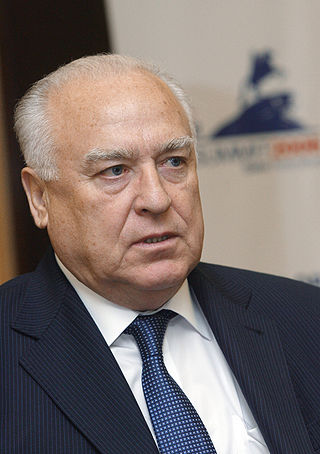
Viktor Stepanovich Chernomyrdin was a Soviet and Russian politician and businessman. He was the Minister of Gas Industry of the Soviet Union, after which he became first chairman of Gazprom energy company and the second-longest-serving Prime Minister of Russia (1992–1998) based on consecutive years. He was a key figure in Russian politics in the 1990s and a participant in the transition from a planned to a market economy. From 2001 to 2009, he was Russia's ambassador to Ukraine. After that, he was designated as a presidential adviser.
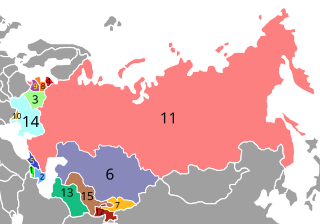
The post-Soviet states, also referred to as the former Soviet Union (FSU) or the former Soviet republics, are the independent sovereign states that emerged/re-emerged from the dissolution of the Soviet Union in 1991. Prior to their independence, they existed as Union Republics, which were the top-level constituents of the Soviet Union. There are 15 post-Soviet states in total: Armenia, Azerbaijan, Belarus, Estonia, Georgia, Kazakhstan, Kyrgyzstan, Latvia, Lithuania, Moldova, Russia, Tajikistan, Turkmenistan, Ukraine, and Uzbekistan. Each of these countries succeeded their respective Union Republics: the Armenian SSR, the Azerbaijan SSR, the Byelorussian SSR, the Estonian SSR, the Georgian SSR, the Kazakh SSR, the Kirghiz SSR, the Latvian SSR, the Lithuanian SSR, the Moldavian SSR, the Russian SFSR, the Tajik SSR, the Turkmen SSR, the Ukrainian SSR, and the Uzbek SSR. In Russia, the term "near abroad" is sometimes used to refer to the post-Soviet states other than Russia.
A Commerce minister is a position in many governments that is responsible for regulating external trade and promoting economic growth. In many countries, this role is separate from a finance minister, who has more budgetary responsibilities.
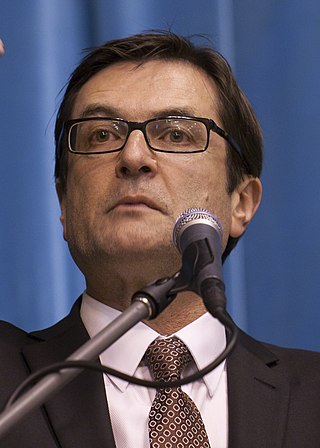
Gregory Ivan Combet is the chairman of Australia’s sovereign wealth fund, the Future Fund. Prior to this he served as chair of the Australian Government Net Zero Economy Agency, overseeing the economic transformation from fossil fuels to renewable energy and net zero emissions.
The Cabinet of Malaysia is the executive branch of the Government of Malaysia. Led by the Prime Minister, the cabinet is a council of ministers who are accountable collectively to the Parliament. According to the Article 43 of the Federal Constitution, members of the Cabinet can only be selected from members of either houses of Parliament. Formally, the Yang di-Pertuan Agong appoints all Ministers on the advice of the Prime Minister. The constitution is amended by repealing the Clause (8) of Article 43, enabling a person who is a member of State Legislative Assembly to continue to serve even while serving as a minister or deputy minister in the cabinet. Ministers other than the Prime Minister shall hold office during the pleasure of the Yang di-Pertuan Agong, unless the appointment of any Minister shall have been revoked by the Yang di-Pertuan Agong on the advice of the Prime Minister but any Minister may resign from office. In practice, the Yang di-Pertuan Agong is obliged to follow the advice of the Prime Minister on the appointment and dismissal of ministers.

The Ministry of Trade, Industry and Energy is a ministry under the Government of South Korea. It is concerned with regulating economic policy, especially with regard to the industrial and energy sectors. The ministry also works to encourage foreign investment in Korea.

Russia's energy policy is presented in the government's Energy Strategy document, first approved in 2000, which sets out the government's policy to 2020. The Energy Strategy outlines several key priorities: increased energy efficiency, reducing the impact on the environment, sustainable development, energy development and technological development, as well as improved effectiveness and competitiveness. Russia's greenhouse gas emissions are large because of its energy policy. Russia is rich in natural energy resources and is one of the world's energy superpowers. Russia is the world's leading net energy exporter, and was a major supplier to the European Union until the Russian invasion of Ukraine. Russia has signed and ratified the Kyoto Protocol and Paris Agreement. Numerous scholars posit that Russia uses its energy exports as a foreign policy instrument towards other countries.

The government of Russia is the federal executive body of state power of the Russian Federation. The members of the government are the prime minister, the deputy prime ministers, and the federal ministers. It has its legal basis in the Constitution of the Russian Federation and the federal constitutional law "On the Government of the Russian Federation". The Apparatus of the Government of Russia is a governmental body which administrates the activities of the government.

Brazil–Russia relations have seen significant improvement in recent years, characterized by increased commercial trades and cooperation in military and technology segments. The two countries maintain important partnerships in areas such as space, military technologies, and telecommunications.
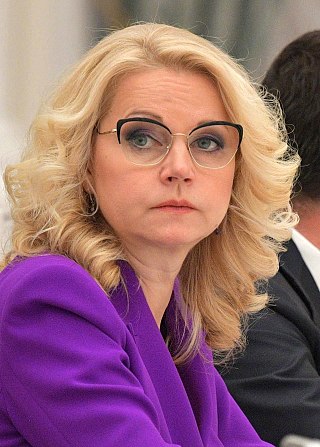
Tatiana Alexeyevna Golikova is a Russian politician and economist who serves as the Deputy Prime Minister of Russia for Social Policy, Labour, Health Care, and Pension Provision since 2018.

The Minister for Climate Change and Energy is a portfolio in the Government of Australia. The current Minister is Chris Bowen. The minister administers his or her portfolios through the Department of Climate Change, Energy, the Environment and Water.
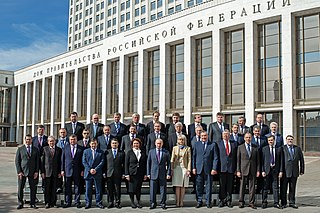
Vladimir Putin's Second Cabinet was a cabinet of the government of the Russian Federation following the 2008 Russian presidential election that resulted in the election of Dmitry Medvedev as the third President of Russia. The second President, Vladimir Putin, was appointed to the position of the Prime Minister of Russia. The cabinet followed Viktor Zubkov's Cabinet.

The first Azarov government was Ukraine's cabinet from its appointment on March 11, 2010 until its dissolution on December 3, 2012. It continued to serve as a caretaker government until 24 December 2012, when the second Azarov government was appointed by president Viktor Yanukovych.

The Ministry of Industry and Tourism (MINCOTUR) is the department of the Government of Spain responsible for the proposal and execution of the government policy on industry, trade and tourism, including among its competences the industrial development and of the SMEs, the promotion and defense of the industrial property, as well as the politics of tourism and the rest of competences and attributions that the legal system attributes to it. Likewise, in coordination with the Foreign Ministry is responsible for the international cooperation on this matters.
The energy policy of the Soviet Union was an important feature of the country's planned economy from the time of Lenin onward. The Soviet Union was virtually self-sufficient in energy; major development of the energy sector started with Stalin's autarky policy of the 1920s. During the country's 70 years of existence (1922–1991), it primarily secured economic growth based on large inputs of natural resources. But by the 1960s this method had become less efficient. In contrast to other nations who shared the same experience, technological innovation was not strong enough to replace the energy sector in importance.

China and Russia established diplomatic relations after the dissolution of the Soviet Union in 1991.
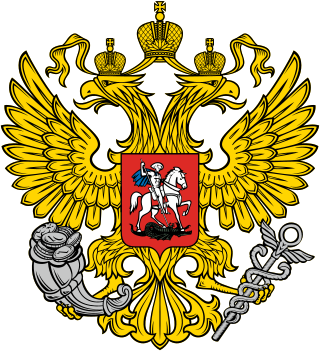
The Ministry of Economic Development of the Russian Federation is a federal ministry in the Russian Government. The ministry is responsible for regulating and forming policies related to socioeconomic and business development in Russia.

The Secretary of State for Business and Trade (Business Secretary), is a secretary of state in the Government of the United Kingdom, with responsibility for the Department for Business and Trade. The incumbent is a member of the Cabinet of the United Kingdom.



















